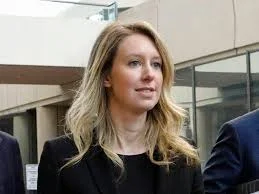Theranos originator Elizabeth Holmes' cases of misuse might confuse jury choice
The in-person addressing of planned legal hearers, up to around 170, began Tuesday in government court in San Jose.
SAN JOSE, California — Theranos originator Elizabeth Holmes' cases that she was manhandled by the organization's head working official, who at the time was her sweetheart, could muddle jury choice in her exceptionally expected extortion preliminary, lawful specialists said.
The in-person addressing of planned attendants, up to approximately 170, began Tuesday in government court in San Jose.
Holmes, 37, has argued not liable to cheating Theranos financial backers and patients by erroneously asserting that the organization had created innovation to run a wide scope of tests on a solitary drop of blood.
Known for dressing in a Steve Occupations style dark turtleneck, Holmes herself has for quite some time been an object of interest in Silicon Valley.
The brilliant ascent and fabulous fall of Theranos diverted Holmes from a youthful extremely rich person to a litigant who could confront a long time in jail whenever sentenced.
Her legal counselors have said she might take the surprising action of standing up in her own protection, something that most respondents decide not to do on the grounds that it frees them up to questioning by examiners.
Court papers submitted over year and a half prior and unlocked late Friday uncovered that Holmes had blamed previous Theranos COO Ramesh "Bright" Balwani of mental and sexual maltreatment.From day one of Elizabeth Holmes trial: Asked if he’s biased against #Theranos, one potential juror says no, “but I’m glad I didn’t invest in the company.” pic.twitter.com/bBsx11jvFJ
— scott budman (@scottbudman) August 31, 2021
Holmes' legal counselors said her "regard" to Balwani persuaded her to think supposedly bogus proclamations about pieces of Theranos that he controlled, including a case about an association with pharmacy chain Walgreens.
The legal counselors told U.S. Area Judge Edward Davila, who is managing the situation, last year that Holmes was "almost certain" to affirm about these cases, court papers show.
Balwani prevented charges from getting maltreatment in a 2019 court recording. He is planned to be taken a stab at extortion charges identified with Theranos after the finish of Holmes' preliminary.#Update: Judge in the Elizabeth Holmes trial again discussing #COVID ..
— scott budman (@scottbudman) August 31, 2021
Air purifiers will be placed throughout the courtroom, including near the jury box.
Filtration system has been improved.
Plexiglass has also been installed. pic.twitter.com/J1zHLag6B3
Legal counselors for Holmes and Balwani didn't quickly return demands for input.
Under the watchful eye of coming to court, 200 potential hearers rounded out surveys about their experience with Holmes, who has been the subject of two books, two narratives and a digital recording. 33 potential legal hearers were pardoned last week, including some who conceded predisposition.
Christina Marinakis, a jury specialist with IMS, a supplier of master and case counseling administrations, said examiners and Holmes' legal counselors have likely searched through potential legal hearers' online media posts for their perspectives about misuse, since they for the most part "don't prefer to discuss these things in open court."
Marinakis said legal hearers might be hesitant to concede to a propensity to see a case of maltreatment as an "pardon" for Holmes' lead.
"They might fear they will be taken a gander at as misanthropes," she said.
Holmes was 18 years of age when she met Balwani, who is 20 years more seasoned than her, and began living with him around three years after the fact, as per "Animosity," Money Road Diary columnist John Carreyrou's top rated book on the Theranos adventure. The book narratives the ascent and fall of the organization Holmes began at age 19, presuming that she was a "controller" whose "ethical compass was gravely topsy-turvey."
Tracy Farrell, a jury advisor who has chipped away at rape cases including church, said Holmes' legal counselors might support more youthful attendants, particularly ladies, who may scrutinize any endeavor by investigators to show the maltreatment safeguard as "simply one more con."
"It makes a sort of cacophony for ladies," Farrell said. "We need to trust them."
Marc Agnifilo, a New York legal counselor, said Holmes' case had a few equals with that of Martin Shkreli, a previous customer saw as liable in 2017 of bilking financial backers in his flexible investments.
Prior to his preliminary, Shkreli acquired reputation for climbing the cost of Daraprim, a medication that treats perilous parasitic diseases, by in excess of 4,000 percent in one day.
Shkreli "enlivened this instinctive negative response that was really difficult to keep out of the jury," Agnifilo said.





Comments